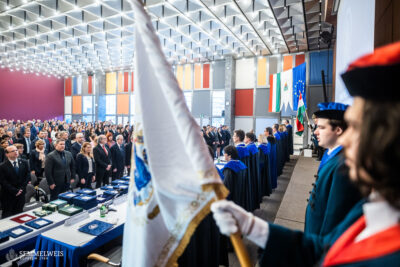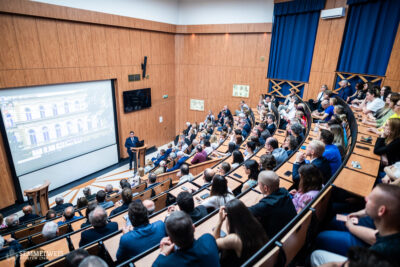“In the past 10 years as a volunteer I have met unique fates and stories which have enriched my life”, says Mrs. Frisch, a retired teacher who spends two hours a week with children at the 2nd Department of Paediatrics.
The Hungarian Hospital Volunteer Care-Giving Service Foundation has 70 volunteers at 8 departments of Semmelweis University, however they would gladly have five times more. They are constantly looking for applicants who could participate in a short training which prepares them for tasks such as distributing meals, making beds, speaking to patients, going for a walk with them or doing the shopping for them at the hospital cafeteria.
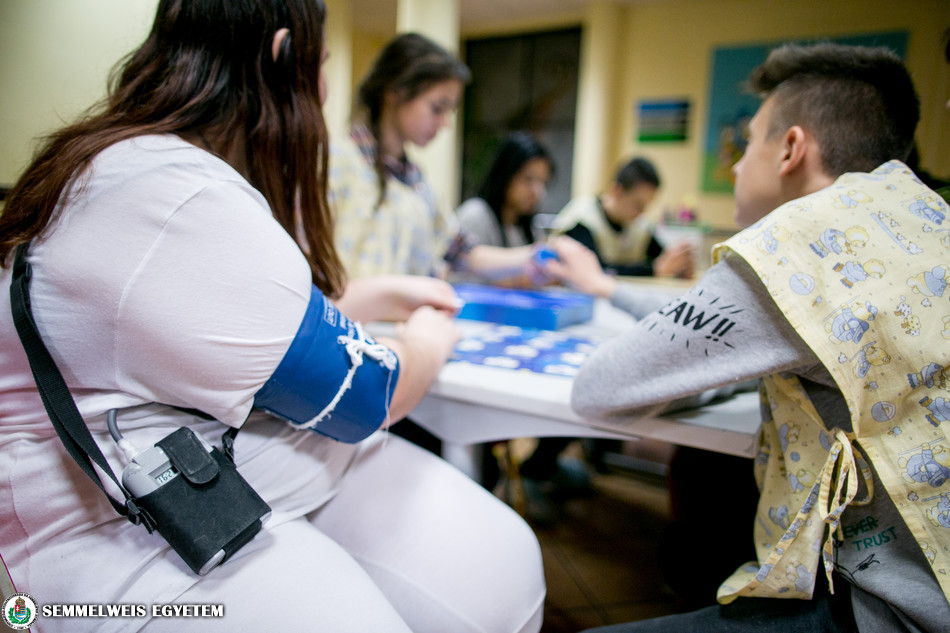 “Volunteers are of great help for both the patients and the nurses”, says Mrs. Marianna Negyedi, Nursing Development professional at the Directorate of Nursing Leadership and Health Care Professionals’ Education.
“Volunteers are of great help for both the patients and the nurses”, says Mrs. Marianna Negyedi, Nursing Development professional at the Directorate of Nursing Leadership and Health Care Professionals’ Education.
The age of volunteers range from teenagers to pensioners who have various professions and interests, thus they make the life of the departments more colourful besides being useful assets to them. The volunteers go through a very strict selection procedure and are trained at a course before starting work at the departments. They have well-defined tasks, therefore they do not substitute the work of doctors or nurses. However, it is not common to have healthcare professionals as volunteers.
Mrs. Fris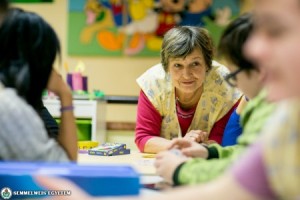 ch has been a volunteer at the 2nd Department of Paediatrics for nearly 10 years. She has participated in the so-called “Double-child” programme, which involves the supervision of high school volunteers and the organisation of playtime for the little patients in the community area.
ch has been a volunteer at the 2nd Department of Paediatrics for nearly 10 years. She has participated in the so-called “Double-child” programme, which involves the supervision of high school volunteers and the organisation of playtime for the little patients in the community area.
“Every occasion is different; sometimes the kids are really enthusiastic, sometimes it is a real challenge to get them involved. We usually play board games, cards or simply have a chat.”, says Mrs. Frisch.
She believes that the high school students benefit greatly from these occasions. There are some students who get their first experience of hardship as volunteers, while others get inspiration for their career choices.
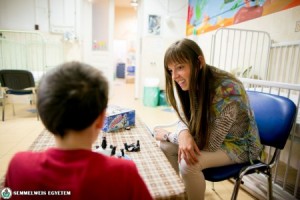 “Here I feel that I am useful and can do something of great value. Playing and just being with the children always recharge me. I am open-minded, like to see new things and believe in lifelong learning. Being a volunteer not only provides you with the opportunity to help but gives insight into new areas of healthcare and fills you with new experiences.”, says Mária Csorba, a volunteer at the 2nd Department of Paediatrics, who is currently preparing for her final exams.
“Here I feel that I am useful and can do something of great value. Playing and just being with the children always recharge me. I am open-minded, like to see new things and believe in lifelong learning. Being a volunteer not only provides you with the opportunity to help but gives insight into new areas of healthcare and fills you with new experiences.”, says Mária Csorba, a volunteer at the 2nd Department of Paediatrics, who is currently preparing for her final exams.
Some decide to do volunteer work because of personal motivation. Psychologist Andrea Győrfi is one of them, who visits the Department of Orthopaedics weekly.
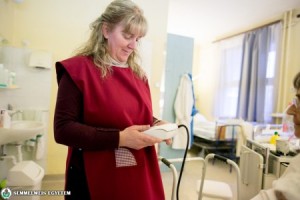 “As a graduate student, I wrote my thesis about cancer patients and unfortunately an old-time friend died of cancer at the age of 36. I am certain that these experiences have played a significant role in my choice of wanting to help patients with bone cancer. Even though the doctors and nurses do their best to treat them well, they are often unable to spend enough time with them. There are some patients who need to spend weeks away from their families and our care and attention mean a lot to them. They do not need much, just a few kind words and some help.”
“As a graduate student, I wrote my thesis about cancer patients and unfortunately an old-time friend died of cancer at the age of 36. I am certain that these experiences have played a significant role in my choice of wanting to help patients with bone cancer. Even though the doctors and nurses do their best to treat them well, they are often unable to spend enough time with them. There are some patients who need to spend weeks away from their families and our care and attention mean a lot to them. They do not need much, just a few kind words and some help.”
The volunteers help at the departments once or twice a week and spend 2-4 hours there. Their tasks are very versatile; they distribute food and drinks, make the beds, speak to patients, help to deliver blood samples to the laboratories, accompany the patients to examinations.
“Besides practical help, they give spiritual support to the patients as well by airing the room, going for a walk with them or doing little errands for them.”, says Erzsébet Jani, coordinator of the Hungarian Hospital Volunteer Care-Giving Service Foundation.
The volunteers of the foundation have been serving at the departments of Semmelweis University since 2013 and currently there are 70 of them. They are stationed at the Heart and Vascular Centre, the 1st and 2nd Departments of Internal Medicine, the Department of Neurology, the Department of Orthopaedics, and the 1st and 2nd Departments of Paediatrics. As there is a great need for volunteers, applicants are always welcome to contact them on the following e-mail address: semmelweis.onkentes@gmail.com.
Tímea Kele
Photo: Attila Kovács – Semmelweis University
Translated by: Ágnes Raubinek

